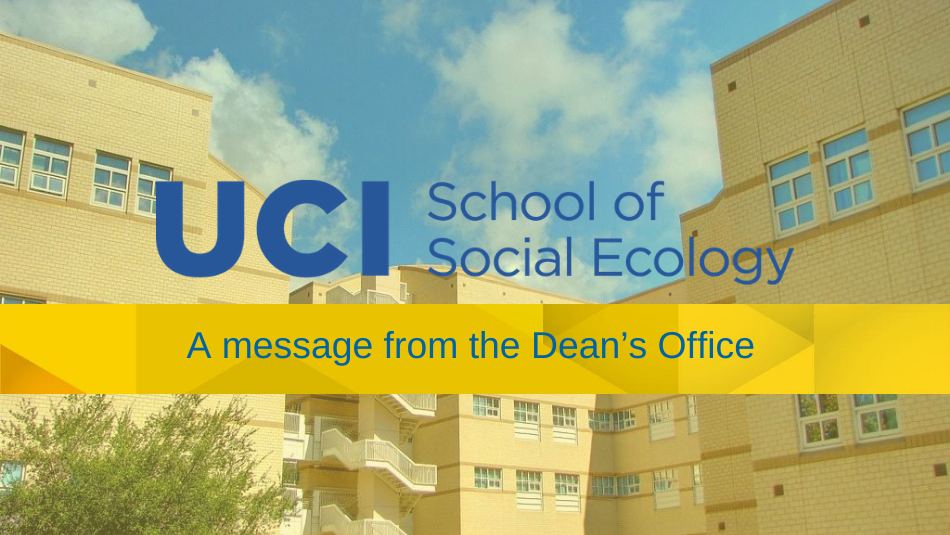
July, 2020
We hope that everyone has had a little time to “breathe” after a whirlwind spring, although we realize there still are many challenges moving forward. One of the most pressing issues we have been confronting in our school is crafting a responsive course of action to address the issues of racism and inequality that are at the core of the Black Lives Matter movement. This is an historic moment as the public health and economic ravages of COVID-19, coupled with police violence against blacks and other people of color, are making explicit the pervasive character of racism and inequality in our country. And, consistent with our focus on ecological systems, we recognize that racism, inequality, marginalization and exclusion are interconnected flaws deeply rooted in the structure of our society.
We’ve been very cautious about sending a message detailing our response before consulting broadly and thinking carefully about next steps. To quote a recent article in the Chronicle of Higher Education, “What universities can do to console their communities in the wake of tragedies is to explain what concrete steps they have taken in ensuring that these tragedies do not happen again. They should detail their commitments not to abstractions but to real groups of people and real departments and programs, in the form of allocations of finances and personnel.”
Given that a major focus in our school is on Science Driving Solutions, we’ve taken time to meet with students, staff and faculty to come up with real-world solutions. In some sense, our school has a bit of a head start in that a significant amount of our research, teaching and service is guided by a social justice framework. We have long studied issues of race, discrimination, inequality in the justice system, disaster response, refugees, human trafficking, urban planning, the differential impacts of environmental stress, slavery, attitudes towards immigration, poverty and so on. We have many centers, programs and initiatives with social justice goals — The National Registry of Exonerations, The Blum Center for Poverty Alleviation, the Center for Evidence-Based Corrections — to name a few.
One suggestion put forward by our students is to expand our field study program in ways that focus explicitly on social justice. We are also investing significant resources in building compassion through our Global Service Scholars program, our Small Change, Better World program, a series of public service announcements, a MOOC and an undergraduate UC-wide minor in the Science and Practice of Compassion. We are promoting compassion based on an awareness, appreciation and respect for our common humanity, as a fundamental and critical component of an anti-racism and social justice strategy.
We now plan to showcase this work more prominently, starting with a dedicated link on our website listing scholarship and service by faculty, students and staff that addresses issues of anti-black practices, racial inequality, systemic bias and social justice. We also are developing a graduate fellowship in race, inequality and social justice (more information to follow). The School is an ideal environment for grounding social change in rigorous evidence-based analysis and encouraging discussion across diverse perspectives. Similar to the Parkside Chat webinars focused on Covid-19, we are planning a series of Equality and Justice chats with faculty about their related research. We will dedicate the next issue of our annual Social Ecology magazine that is sent to all alumni and supporters to Race, Inequality and Social Justice.
Faculty have been very successful communicating their findings on ideas, practices and policies to combat racism and inequality. These are just examples of recent op-eds and reviews:
- Emily Owens on police in schools in Christian Science Monitor.
- Michael Mendez on fighting climate change and racial injustice in Bloomberg News.
- Maria Rendon book review in The American Interest.
- Beth Cauffman’s work with the innovative Young Adult Court showcased in the Orange County Register.
- Simon Cole on the importance of fingerprint matching and exonerations in the Los Angeles Times.
We also believe it is critical to continue a public dialogue about anti-blackness, racism, inequality and injustice and encourage active participation by students. In the US at this time, there are major divisions about how to proceed. Some people believe our major systems offer a positive framework (e.g. capitalism, liberal democracy) and that many of our smaller systems also are well designed (e.g. courts, policing), but they acknowledge flaws exist and reforms are needed. Others believe that these major systems are no longer meeting real social needs and aspirations and so we need to think about bigger forms of transformation--e.g. toward sustainable development or democratic socialism. This attitude leads to a very different set of discussions, priorities, and agendas. The central point is that a university needs to be committed to encouraging critical thinking and lively discussion about uncomfortable and complex topics.
Toward this end, in collaboration with our ASUCI representatives, we are hosting Black Lives Matter conversations and town halls, with the next one slated for July 24 at 2 p.m. We are partnering with the School of Humanities and other schools on campus to sponsor The 1619 Project through virtual experiences this October. This will involve a series of discussions and podcasts that explore the significance and contemporary relevance of slavery and social injustice in forming political institutions, the economy, health care, housing patterns and cultural expression in the US. We also plan to solicit students’ suggestions regarding a speakers’ series, that could culminate in a big event in the spring.
Finally, we believe that the work of building and sustaining an inclusive and racially equitable culture is everyone’s responsibility. We hope as a school we can engage in a series of actions that will move us all further along on this path. Let us know your thoughts.
Nancy Guerra, Richard Matthew, Susan Bibler Coutin and Greg Reinhard